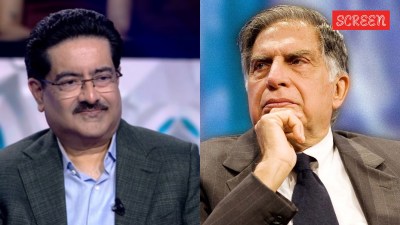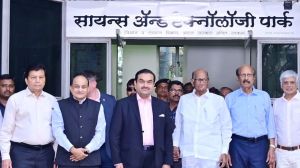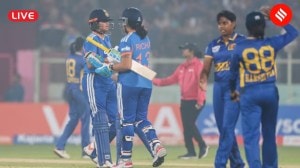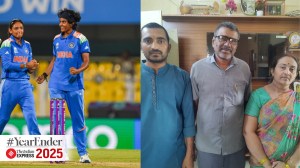145;Bai TV rules today146;
Yes, you heard it right. The quizmaster has waded into the murky waters of soap operas8212;Jiya Jale is Siddharth Basu8217;s production house Synergy Adlabs8217; daily on INX Media. Basu spoke to eye on what took him there, the spectacle that is Indian television, his favourite serials and the forthcoming desi quiz show on Sahara One8211;Bollywood Ka Boss

The audience sees you as a cerebral content provider. And now you are launching a TV soap Jiya Jale. What difference will your production house bring to this much-maligned genre?
In my book, content will always be king and substance will precede style. As a production house, Synergy has always been open to any genre. We produced a definitive debate show called a Question of Answers for two years with Vir Sanghvi. Now, after the alliance with Adlabs, we have the wherewithal to diversify and expand. We8217;re looking to be an A team in whatever genre we take up. But it is true that the daily is the most conservative of genres on Indian TV today. The soap has a rigid dogma, is almost a religion with the faithful and has a huge, compulsive mass following. While I believe viewers are ready for departures, the guardians of this space will allow only for gradual innovation.nbsp;
What is the USP of Jiya Jale and why did you opt to make your daily soap debut on a new channel like INXMedia?
The story and narrative style of Jiya Jale can best be described as the classic domestic drama, going back to an earlier era of cinema. INX believed in the story and backed us in the way we believed it needed to be mounted. So we went with it.
What8217;s the brief guiding fiction content from your house? Do you get to watch any soaps or do you have a favourite serial?
Our only guideline is that it needs to find, please and provoke its viewers, and should not cross the lakshman rekha of basic values to chase ratings. I frankly haven8217;t watched any desi soap for more than a few minutes in recent years. Off the cuff, I can recall Buniyaad, which began brilliantly, and Lifeline, which was superb life-and-death hospital drama, with exceptional talent. My daughter and wife used to watch Jassi8230; when it began. My kind of TV drama is 248212;thrilling, heart-pounding drama, which is realistic and set in the nervous heart of the most powerful nation in the world. I like Desperate Housewives for the mysteries and undercurrents below suburban lives. There are others I8217;ve thoroughly enjoyed8212;The Practice, Boston High, Picket Fences, Wonder Years.nbsp;
You made your TV debut in Doordarshan8217;s golden age. Has the relationship between a broadcaster and content provider changed for the better now?
The saving grace of DD was its public service charter but its biggest downside was its bureaucracy and political interference. When it began to commercialise, producers were reduced to supplicants and treated as petty contractors. In satellite TV, a limiting and flawed rating system has become the be-all and end-all of evaluation. The current wisdom is that the bulk of compulsive TV consumers are female, 15-35 years, of the socioeconomic category C, D, E, leading to the guiding programming mantra8212;8221;Whatever my bai likes to watch.8221; So, Bai TV rules. Think of a society where only potboilers and bestsellers rule and you8217;ll see what sort of world our commercial TV is leading to. I believe that if instant success stops being an obsession, programmers and producers can create compelling fare that finds enough viewership.
Reality shows seem to be the flavour of the season yet they are mostly limited to being international adaptations.
Reality shows have done well in India only when they are part of a spectacle. Perhaps because we have too much reality all around us and we need our illusions to survive! Strictly speaking, reality shows are those which use documentary techniques in a general entertainment context. In that sense, many of the Hindi news channels have sadly become cheap reality channels. They seek only to titillate and are only remotely concerned with news. On general entertainment channels, reality shows add a dimension of real-life, human-interest drama to regular talent contests and song and dance shows. But unlike in the West, where it8217;s cheaper to do reality shows, in India, the converse is true. Along with song and dance, for which there8217;s a ready audience, we8217;ll inevitably see the next generation of reality shows, but they will need to be part of a spectacle of some sort.
Jhalak Dikhhla Jaa 2 no longer has a mix of celebrities from different callings. We see a predominance of film and TV personalities. What is your involvement in the choice of celebrities?
The choice of contestants reflects the mindset of the media. The celebrities who dominate media are predominantly from film, TV, and to a lesser degree, from sports unless they8217;re cricket superstars. And this is for an audience with whom Page 3 or society pages barely registers. Having said that, Negi has been one of the most popular choices on Jhalak 2. But there are strong sales and marketing imperatives at work here and it8217;s the broadcaster who makes all the calls on celebrities.nbsp;nbsp;nbsp; nbsp;
Was Boman Irani your first choice to host Sahara One8217;s Bollywood Ka Boss?
Boman is a fantastic entertainer and a big Bollywood buff to boot. He has the profile and wit that made him a good fit for the channel, and that8217;s what made him Filmy8217;s first and only choice. We were more than happy to go along.
Quiz Time was a first in the genre of quizzing on TV. Will we ever see you don the quizmaster8217;s mantle in a show again?
Believe it or not, I8217;ve never fancied seeing myself on the screen or even a mirror.nbsp; I8217;m relieved to not have to perform in front of the camera, and am frankly not looking to regularly host any show. I do conduct live quizzes once in a while, and enjoy doing that.
- 01
- 02
- 03
- 04
- 05































